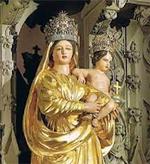Synod, October 14-15: presiding sister says Synod is ‘setting the stage for future changes’
October 16, 2023
On October 14, participants in the first session of the 16th Ordinary General Assembly of the Synod of Bishops continued to discuss the Synod’s third topic: “Co-responsibility in Mission: How can we better share gifts and tasks in the service of the Gospel?” (module B2).
Free eBook:

|
| Free eBook: Essays in Apologetics, Vol. I |
Press conference
On Saturday, October 14—erroneously described as a Thursday in Vatican News’s coverage—340 of the Synod’s 364 voting members were present for deliberations. Presiding in the place of the Holy Father was Sister María de los Dolores Palencia Gómez, CSJ, one of the nine presidents-delegate who preside when the Pope is absent.
The presidents-delegate include a Patriarch, five other bishops, a priest, Sister Palencia, and a laywoman. Sister Palencia’s act of presiding over the synodal assembly was the first time that a religious sister (or any woman) has presided at a Synod of Bishops.
At the daily press conference, Sister Palencia said that the Synod is “setting the stage for future changes” on the role of women in the Church.
“I feel that this is a gradual process,” she said. “Little by little, we shall see changes.”
Her work as a president-delegate, she added, reflects “a modus vivendi that is making its way in the Church, calling all baptized men and women to co-responsibility and, at the same time, respecting all diversity.”
Journalist Diane Montagna asked Abbot Mauro Giuseppe Lepori, the Abbot General of the Cistercian Order, about women’s ordination: “Some say the push for women deacons in the Synod is no different from the feminist push for women deacons in the Anglican communion—which led to women priests and bishops. How is this not a step to further ordination?”
In his reply, which did not directly address her question, Abbot Lepori said at first that women’s ordination to the priesthood was not “dominant” in discussions, and then said that “no one has spoken about women’s priesthood.” Participants, however, were discussing the possibility of women’s ordination to the diaconate because it was mentioned in the Synod’s working document. Abbot Lepori spoke of the importance of a profound reflection and discussion of the meaning of the vocation of man and woman in the Church, as well as the meaning of Holy Orders.
Unsecured server
Paolo Ruffini, prefect of the Dicastery for Communication, discussed the posting of confidential Synod documents to an unsecured server, with the documents available to anyone with the knowledge of the web page’s URL.
Ruffini explained that the original password requirement was eliminated because some participants had problems accessing the documents using a password. The information, he continued, was now secure:
The General Secretariat of the Synod created a cloud to share some documents with Synod members. Access to the cloud required credentials—username and password—but since some members, for various reasons, had not been able to access it, the General Secretariat decided to create a link for those who knew the address so they could access the documents in the cloud directly without credentials.
Until the end of the first module, the cloud contained only public documents, i.e. the texts of the reports you received and the photos that were shared for testimony and documentation. At the end of the first module, due to the difficulty of a large number of members, the Secretariat decided to upload the summaries of the 35 working groups on Segment A to the cloud. On the other hand, the personal contents that each member had been able to listen to in the General Congregations were not uploaded.
The aim was to allow all members to conveniently access information useful for their synodal discernment. It is not a question of documents that we could call ‘classified’, but of confidential documents in order to protect the space of common discernment ...
It was decided to reinstate the username and password requirement. There is nothing secret, but the will of the General Secretariat of the Synod is to maintain confidentiality on the individual reports of each working group.
The confidentiality surrounding the reports of the working groups has helped make the current Synod the least transparent one in recent decades. During the pontificates of St. John Paul II and Pope Benedict XVI, the Vatican routinely published the Synod fathers’ speeches (interventions). Under Pope Francis, that practice ceased, but the Vatican published the reports of the working groups. The current Synod’s rules forbid participants to discuss even their own interventions.
The Synod adjourned on Sunday, October 15, and resumed its deliberations the following day.
Earlier coverage
- Synod of Bishops publishes retreat texts
- Pope at Synod’s opening Mass: Let us walk with the Holy Spirit
- Synod, October 4: Pope emphasizes role of Holy Spirit; Cardinal Hollerich calls for ‘new insights’
- Synod, October 5: ‘Expert-facilitators’ guide discussion; final report will form agenda of 2024 Synod session
- Synod, October 6: discussion of 1st topic nears close; Vatican spokesman says participants may speak with media
- Synod, October 7-8: working groups submit first reports; leading African cardinal emphasizes listening, discernment
- Synod, October 9: participants turn to new topic; Orthodox prelate draws sharp contrast between Eastern synodality, current Synod
- Synod, October 10: participants discuss 2nd topic, elect members of key commission
- Synod, October 11: some participants call for ‘greater discernment’ of Catholic teaching on sexual morality
- Synod, October 12: participants pray for peace
- Synod, October 13: Cardinal Hollerich asks participants to set aside their own thinking, listen to others
For all current news, visit our News home page.
All comments are moderated. To lighten our editing burden, only current donors are allowed to Sound Off. If you are a current donor, log in to see the comment form; otherwise please support our work, and Sound Off!






